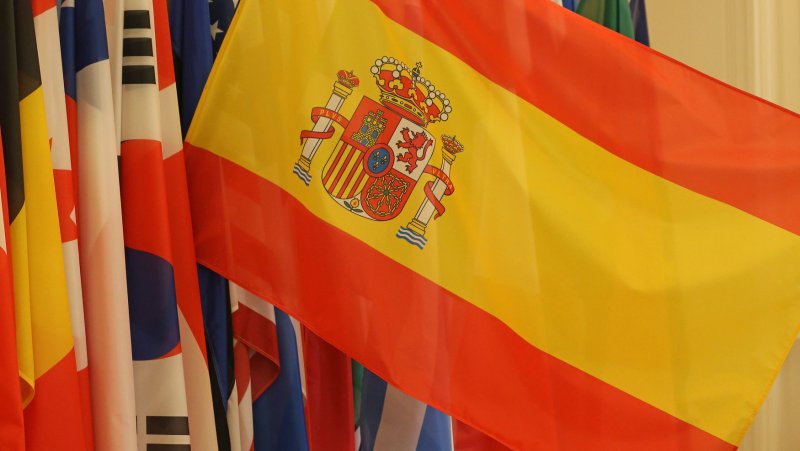The flag of Spain is seen among the flags of various nations on June 8, 2012. Spain has come under pressure lately with government debt concerns, plaguing Greece, Portugal and Italy as well. UPI/ David Silpa |
License Photo
MADRID, Sept. 27 (UPI) -- Angry protesters marched on Spain's Parliament early Thursday ahead of Prime Minister Mariano Rajoy's release of an austerity budget and new reforms.
The government was also to release the results of an independent "stress test" audit of the Spanish banking sector, which Finance Minister Luis de Guindos said would likely show the sector faces at least a $77 billion shortfall.
The third day of protests, which had no immediate reports of violence, were in contrast to Tuesday's clashes between police and demonstrators in front of the Parliament building.
They came a day after Spain's central bank said Wednesday the recession-bound economy continued to contract at a "significant rate" in the third quarter, with all major indicators deteriorating.
This follows a second-quarter gross domestic product contraction of 1.3 percent.
Greece was also shut down by a general strike Wednesday, with 50,000 people marching on the Parliament. Prime Minister Antonis Samaras is facing intensifying international-lender demands for stronger austerity measures and rage among a population hit with 24 percent unemployment.
Spain's 10-year borrowing costs rose above the danger line of 6 percent, and Rajoy told The Wall Street Journal if rates remained "too high for too long" Spain "would ask for this bailout."
But he said, "At the moment, I cannot tell you" if Spain planned to seek international assistance.
He also told a meeting in New York of the Americas Society and Council of the Americas, dedicated to fostering Hispanic world relations, that despite the Madrid protests, Spain's "silent majority" assumes sacrifices without complaining.
The latest Metroscopia poll shows 84 percent of Spaniards, and 59 percent of voters of his Peoples Party, said they lost confidence in his leadership.
The euro fell to a two-week low against the dollar.
Spain's financial pressures were compounded by a constitutional crisis brewing in the wealthy northeastern Catalonia region, which called snap elections Tuesday for Nov. 25. The elections are being called by the region's powerful leader a proxy referendum on independence.
Catalonia -- an autonomous community with the official status of a "nationality" -- is Spain's largest region by output but also its most indebted. It recently requested a $6.5 billion bailout from the central government.
Catalan leader Artur Mas i Gavarro said in Barcelona Catalonia understood a referendum must be approved by Madrid to be legally binding, but he said nothing could stop the Catalan people from making "sovereign decisions."
"Firstly there is the intention to do it in accordance with the law, and if that can't be done we will do it all the same," the Financial Times quoted Mas as saying.
Mas described recent events as the most dramatic in Catalan history.
Rajoy's 2013 budget plan, together with other changes aimed at improving the way Spain's economy functions, could shore up investor confidence in the eurozone's No. 4 economy, the Journal said.
Analysts told the newspaper investors would watch the budget for any indications Spain was laying the groundwork for a bailout request.










